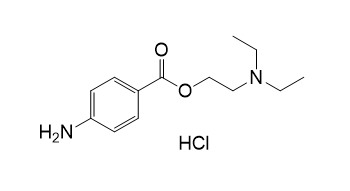Procaine hydrochloride
Procaine hydrochloride shows protective effect on cisplatin-induced alterations in rat kidney.
Inquire / Order:
manager@chemfaces.com
Technical Inquiries:
service@chemfaces.com
Tel:
+86-27-84237783
Fax:
+86-27-84254680
Address:
1 Building, No. 83, CheCheng Rd., Wuhan Economic and Technological Development Zone, Wuhan, Hubei 430056, PRC
Providing storage is as stated on the product vial and the vial is kept tightly sealed, the product can be stored for up to
24 months(2-8C).
Wherever possible, you should prepare and use solutions on the same day. However, if you need to make up stock solutions in advance, we recommend that you store the solution as aliquots in tightly sealed vials at -20C. Generally, these will be useable for up to two weeks. Before use, and prior to opening the vial we recommend that you allow your product to equilibrate to room temperature for at least 1 hour.
Need more advice on solubility, usage and handling? Please email to: service@chemfaces.com
The packaging of the product may have turned upside down during transportation, resulting in the natural compounds adhering to the neck or cap of the vial. take the vial out of its packaging and gently shake to let the compounds fall to the bottom of the vial. for liquid products, centrifuge at 200-500 RPM to gather the liquid at the bottom of the vial. try to avoid loss or contamination during handling.
Hum Exp Toxicol.2023, 42:9603271231171642.
Antioxidants (Basel).2023, 12(2):447.
Anticancer Res.2024, 44(3):1033-1044.
J Ethnopharmacol.2017, 206:327-336
Pharmaceutics.2020, 12(9):845.
Buildings2023, 13(5), 1112.
Bull. Natl. Mus. Nat. Sci.2021, 47(2),109-114.
HIV Med.2021, 22(8):690-704.
Prev Nutr Food Sci.2025, 30(1):92-100.
The University of Manitoba2021, 35690.
Related and Featured Products
Anticancer Drugs, 2002, 13(10):1043-1054.
Protective effect of procaine hydrochloride on cisplatin-induced alterations in rat kidney.[Reference:
WebLink]
Efforts have been made to reduce the undesirable side effects of cisplatin, mainly nephro- and neurotoxicity, but their reduction is usually accompanied by a concomitant inhibition of antitumor activity. The local anesthetic Procaine hydrochloride (P.HCl) improves the therapeutic index of cisplatin not only by the reduction of its nephro- and hemotoxicity, but also by an increase of its antitumor activity. We therefore investigated the effects of a combined treatment of cisplatin and P.HCl on rat kidneys and compared this to kidneys from rats treated with a toxic dose of cisplatin or P.HCl alone.
METHODS AND RESULTS:
Treatment with a saline solution was used as control. Dehydrogenase activities [succinate dehydrogenase (SDH) and NADPH diaphorase reaction demonstrating nitric oxide synthase (NOS/NADPHd)] and phosphatase activities [K+ p-nitrophenyl phosphatase (K+ pNPPase), alkaline phosphatase (AlPase) and acid phosphatase (AcPase)] were studied on cryostatic sections of kidneys from controls and treated rats. Evidence of heavy morphological damage and altered AlPase and AcPase activities induced by cisplatin were observed in the S3 segment of the proximal tubules. In addition, SDH and K+ pNPPase activities showed some changes in the distal tubule cells. The NOS/NADPHd activity in macula densa was drastically reduced. Combined treatment of cisplatin and P.HCl greatly attenuated morphological alterations of the rat kidney and reduced the changes in enzyme activities, except for NOS/NADPHd activity, compared to the cisplatin-treated group of animals.
CONCLUSIONS:
The study indicates that, in cisplatin-induced nephrotoxicity, a significant role is played by enzyme activities, in particular K+ pNPPase and NOS/NADPHd, and that P.HCl can mitigate the nephrotoxicity of cisplatin, possibly by influencing some enzyme activities involved in important renal metabolic pathways.
Digestion, 2004, 69(1):5-9.
Procaine hydrochloride fails to relieve pain in patients with acute pancreatitis.[Pubmed:
14755147 ]
Several analgesics are in use for pain control in patients with acute pancreatitis. Procaine hydrochloride (procaine) has a long tradition and is recommended by the German Society of Gastroenterology and Metabolic Diseases for pain treatment in patients with acute pancreatitis. There is no controlled trial showing that procaine could be effective for pain treatment.
METHODS AND RESULTS:
In an open, randomized, controlled trial, 107 patients (76 male, 31 female; mean age 45 +/- 12 years) were included and randomized either to receive procaine (n = 55) or pentazocine (n = 52) for pain relief. Procaine 2 g/ 24 h was administered by continuous intravenous infusion, pentazocine 30 mg was administered every 6 h as a bolus intravenous injection. Pentazocine was additionally administered on demand whenever required in patients of both treatment groups and its total consumption was recorded. Pain scores were assessed twice daily on a visual analogue scale. Patients receiving procaine were significantly more likely to request additional analgesics compared to patients treated with pentazocine alone, 98 vs. 44%, respectively (p < 0.001). Procaine did not reduce the amount of pentazocine required for pain control. The amount of pentazocine given in both groups was not statistically significantly different. Recorded pain scores were significantly lower (p < 0.001) in patients in the pentazocine group during the first 3 days of analgesic treatment. From day 4 on there was no significant difference in pain scores among the two groups.
CONCLUSIONS:
Thus, intravenous procaine treatment is not effective for pain control in patients with acute pancreatitis.
Electroencephalography & Clinical Neurophysiology, 1979, 47(2):204-212.
The effect of procaine hydrochloride and diazepam, separately or in combination, on cortico-generalized kindled seizures.[Reference:
WebLink]
The effects on cortically kindled seizure responses of
Procaine hydrochloride, diazepam and combinations of these two drugs were tested in this study.
METHODS AND RESULTS:
The cortex was stimulated until seizure responses developed past the focal stage (accompanied primarily by brief tonic convulsions) to the cortico-generalized stage (accompanied, typically, by an early brief tonus followed by a longer clonic seizure that is characteristic of subcortically triggered seizures). Diazepam was found to block the generalized component of the cortico-generalized electrographic and motor seizure leaving the tonus only slightly suppressed. Procaine blocked the tonus leaving the clonic seizure and discharge that is characteristic of the generalized response relatively intact.
CONCLUSIONS:
Combinations of half doses of the two drugs completely blocked all electrographic and motor seizure responses in about half the animals. The remaining animals had a very brief discharge with no convulsive responses.



